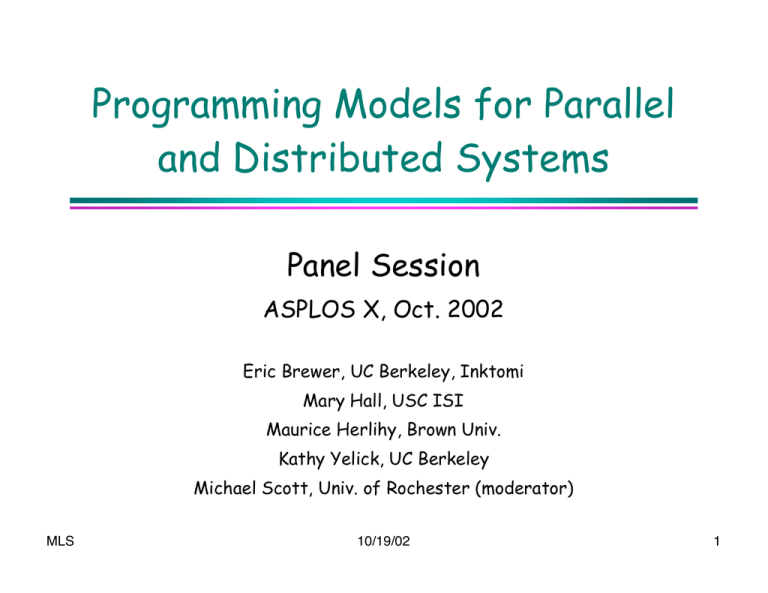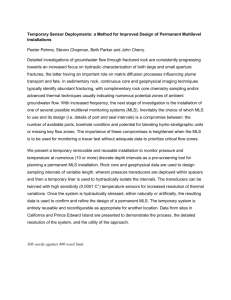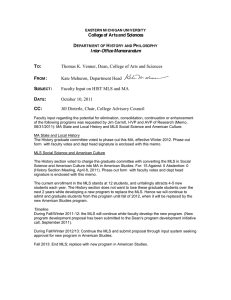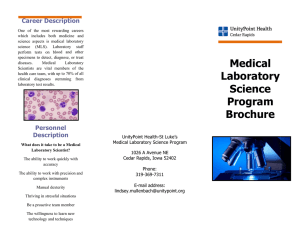Programming Models for Parallel and Distributed Systems Panel Session ASPLOS X, Oct. 2002
advertisement

Programming Models for Parallel and Distributed Systems Panel Session ASPLOS X, Oct. 2002 Eric Brewer, UC Berkeley, Inktomi Mary Hall, USC ISI Maurice Herlihy, Brown Univ. Kathy Yelick, UC Berkeley Michael Scott, Univ. of Rochester (moderator) MLS 10/19/02 1 How did we get here? 4 4 4 4 MLS Tons of work on parallel languages and models in the late 70s and 80s Some of it bad, but much of it good, from a conceptual point of view But nobody offered a really big win, and they often insisted on complete religious conversion We couldn’t get good performance with good models, so we settled for good performance with poor models 10/19/02 2 And where exactly are we? 4 To first approximation - nobody uses explicitly parallel languages (other than Java) - nobody uses parallelizing compilers - the tightly coupled and distributed worlds use completely different programming models - but they all take the form of library calls -- no significant language or compiler support MLS 10/19/02 3 Moreover 4 Programmers aren’t getting any smarter 4 The environment keeps getting messier - machines are growing more complex - e-commerce, the GRID, and technological trends are pulling parallel and distributed systems together - HPC is going mainstream MLS 10/19/02 4 ASPLOS: Architectural Sabotage of Programming Languages and Operating Systems 4 relaxed memory models 4 4 HW synchronization PIM 4 sensor motes 4 active disks 4 user-level NICs 4 programmable NICs 4 etc., etc., etc. 4 MLS threaded and clustered processors 4 deep memory hierarchies 4 pefetching, self-invalidation, etc. 4 communication /computation gap 10/19/02 5 Emerging Applications 4 Simulation 4 Modeling and rendering - weather, economics, biological systems, games - 3D photography, immersive virtual environments, augmented reality, telepresence, games 4 Intelligent interfaces - vision / recognition / pattern matching / search - language and knowledge -- statistical speech models, modeling of user intent ‹ These are HPC ! MLS 10/19/02 6 Belligerent opinions 4 Pthreads are sort of ok 4 MPI, OpenMP, and the M4 macros are not! 4 RPC/RMI is sort of ok 4 Sockets are not! 4 MLS - too hard to use - not applicable to non-HPC-style systems Parallel programming is (still) ‘way, ‘way harder than it “ought” to be. 10/19/02 7 Recommendation #1 4 Recognize that both shared memory and message passing have a place - Shared memory good for passive communication - Message passing good for active communication - Much of the time you can use either (matter of taste) - Sometimes you need one or the other; witness ü events in shared memory systems ü put() and get() in message passing systems ‹ Many applications would benefit from both MLS 10/19/02 8 Recommendation #2 4 Make the easy stuff easy - coherent shared memory (CC-NUMA, S-DSM, or DSS) for ü fast prototyping ü non-performance critical code - global address space with put() and get() for performance tuning of shared memory code - transactions for atomic update (Maurice) - 2-ended message passing for active communication - These models can comfortably co-exist within a single application MLS 10/19/02 9 Recommendation #3 4 Leverage the compiler - parallelize what you can (Mary) - provide language support for the explicitly parallel stuff (Eric) ü typesafe communication ü invariant checking ü exception handling ü transactions ü data placement when necessary ü parallel operations (e.g. loops) MLS 10/19/02 10 Recommendation #4 4 Don’t embed HPC assumptions (Kathy) - can’t afford to assume ü fixed number of processes ü single process per processor ü uniprogrammed workloads ü homogeneous hardware ü availability / replication ü fault tolerance / recovery ü language and machine heterogeneity ü distribution / mobility ü persistence - must accommodate - potential big wins for grid computing today; enormous wins for pervasive / ubiquitous computing tomorrow MLS 10/19/02 11 Closing Thoughts MLS 4 HPC is going mainstream 4 The applications will be really exciting 4 We need programming models that merge 4 These ideas are mutually compatible - explicit and implicit parallelism - shared memory and message passing - data-parallel and distributed / mobile components - automatic and manual locality management 10/19/02 12






